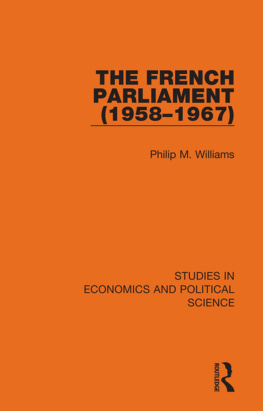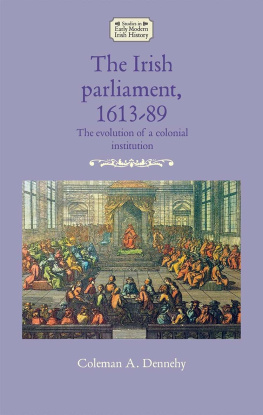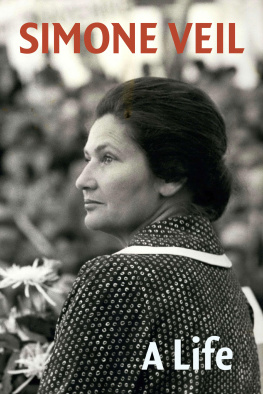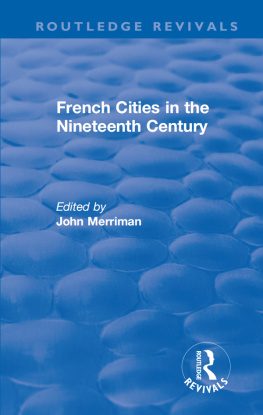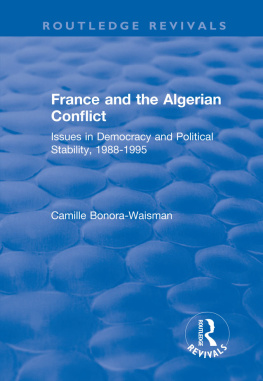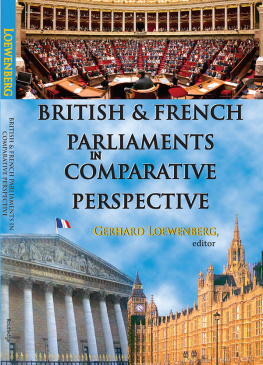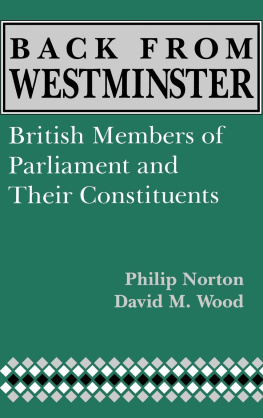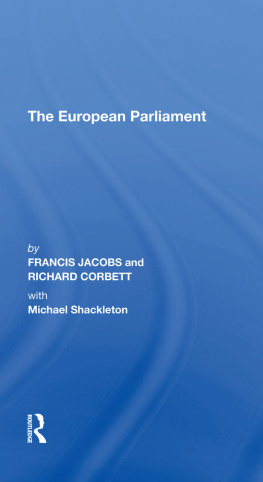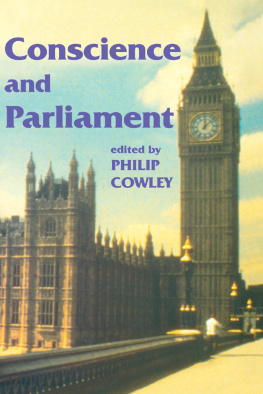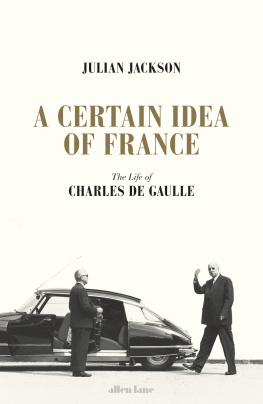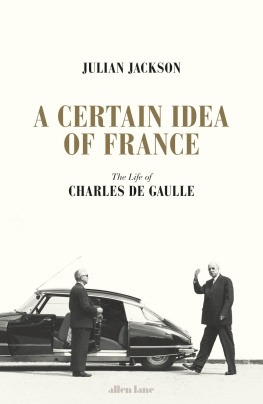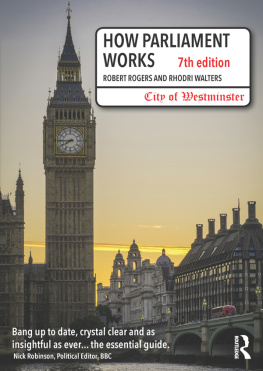Studies in Economics and Political Science
Volume 12
The French Parliament (19581967)
First published in 1968 by George Allen & Unwin Ltd
This edition first published in 2022
by Routledge
2 Park Square, Milton Park, Abingdon, Oxon OX14 4RN
and by Routledge
605 Third Avenue, New York, NY 10158
Routledge is an imprint of the Taylor & Francis Group, an informa business
1968 George Allen & Unwin Ltd
All rights reserved. No part of this book may be reprinted or reproduced or utilised in any form or by any electronic, mechanical, or other means, now known or hereafter invented, including photocopying and recording, or in any information storage or retrieval system, without permission in writing from the publishers.
Trademark notice: Product or corporate names may be trademarks or registered trademarks, and are used only for identification and explanation without intent to infringe.
British Library Cataloguing in Publication Data
A catalogue record for this book is available from the British Library
ISBN: 978-1-03-212459-9 (Set)
ISBN: 978-1-00-322951-3 (Set) (ebk)
ISBN: 978-1-03-213041-5 (Volume 12) (hbk)
ISBN: 978-1-03-213051-4 (Volume 12) (pbk)
ISBN: 978-1-00-322741-0 (Volume 12) (ebk)
DOI: 10.4324/9781003227410
Publishers Note
The publisher has gone to great lengths to ensure the quality of this reprint but points out that some imperfections in the original copies may be apparent.
Disclaimer
The publisher has made every effort to trace copyright holders and would welcome correspondence from those they have been unable to trace.
The French Parliament (1958-1967)
Philip M. Williams
Nuffield College, Oxford
FIRST PUBLISHED IN 1968
This hook is copyright under the Berne Convention. Apart from any fair dealing for the purposes of private study, research, criticism or review, as permitted under the Copyright Act, 19569 no portion may be reproduced by any process without written permission. Enquiries should be addressed to the publisher.
George Allen & Unwin, Ltd 1968
printed in great britain
in 10 on 11 point Plantin type
by willmer brothers limited
birkenhead
Preface
This book sets out to give a brief description of the French Parliament in the new constitutional and political conditions of the Fifth Republic. A good deal has been written about the abnormal early years of the new regime, while the Algerian war dominated the scene; this work attempts to redress the balance by discussing the years from 1962 to 1967 when the Gaullists enjoyed a secure majority in the National Assembly. Most of it was written before the 1967 election, but important developments in the first weeks of the third Parliament are mentioned in footnotes.
I owe particular thanks to the help and encouragement of my friends and colleagues at Nuffield College, Oxford, and at the Fondation Nationale des Sciences Politiques and elsewhere in Paris; to David Goldey for his help at all stages from the first draft to proofs; to Jean Brotherhood for secretarial patience beyond the call of duty; and to the constructive criticisms of Malcolm Anderson, Pierre Avril, Vernon Bogdanor, Claude Brosse, Franois Goguel, Martin Harrison, Roger Hugh, Bill Johnson, Joel Le Theule, Guy Lord, Graham Thomas and Gavin Williams. They have saved me from many errors and blemishes; for those that remain, and for judgments with which they no doubt often disagree, the responsibility is entirely mine.
Oxford
May 1967
Philip M. Williams
Abbreviations
CCCComit Consultatif ConstitutionnelCCCAvis et dbats du CCC*
JOJournal Officiel, Dbats de lAssemble Nationale*
JO (Senat)Journal Officiel, Dbats du SnatMRPMouvement Rpublicain Populaire (Christian Democratic party)NATONorth Atlantic Treaty OrganizationOASOrganisation de lArme Secrte (Algerian European terrorists)ORTFOffice de RadiodiffusionTlvision FranaisePRProportional representationRDPRevue du Droit Public et de la Science PolitiqueRFSPRevue Franaise de Science PolitiqueRIRpublicains Indpendents (Conservative Gaullists)RPFRassemblement du Peuple Franais (Gaullist party 194753)TVATaxe sur la valeur ajouteUNRUnion pour la Nouvelle Rpublique (Gaullist party 195867)
* The date is that of the debate, not that of publication.
I The Old Regime and the New Remedies
(I) The Old Regime
The decline of Parliament is an old story. Announced by Bryce in 1920, it has characterized a century which, as Wheare has shown, has been hard on legislatures. Many explanations have been offered: the mass electorate; the States intervention in the economy; the growth of bureaucracy; the need for strong and rapid executive decisions in an age of economic and international crisis; the concentration of public attention and loyalty on heads of government through the mass media; the complexity of modern military and economic problems compared to the (supposedly) simple issues of principleslavery, home rule for Ireland, relations of Church and Statewhich dominated the politics of the liberal era. While parliaments may function and even flourish from India to Germany, in their old homes they seem weaker than ever before.
Among the major States, only three have a long-established democratic tradition. In these three countries the legislatures play quite different roles. In the United States, Congress and the Presidency are independent of one another: each can hamper the others activities but not threaten its existence. But whereas in the last century Congress was often the real originator of policy and source of effective leadership, in recent decades the power of the Presidency has grown overwhelmingly. Congress now rarely takes the lead even in the legislative field proper. Its incapacity to initiate action or dominate policy is seen most clearly when, with a weak President in the White House, the United States suffers from a vacuum of leadership. But its esprit de corps remains strong and as an obstructive force Congress can still be very effective, especially when the party opposing the President controls one or both houses. In Great Britain the House of Commons is no longer a forum where cabinets, or even major laws, are created or destroyed. Except in very unusual circumstances the electorate chooses the government, and the government, through party discipline, controls the House of Commons. Almost every important bill is brought in by the cabinet and none passes without its tolerance. Parliament can still play an important role in ventilating the grievances of groups and individuals and in persuading ministers, by argument or by arousing public opinion, to modify their proposals in detail. Sometimes it can veto a measure which never sees the light of day at all. But its most conspicuous function is to provide a forum for criticism and debate, and to conduct over five years the real election campaign which reaches a climax when the house is dissolved.
The French Parliament today is much weaker than the Congress of the United States and somewhat weaker than the British House of Commons. But under the Third and Fourth Republics it was far stronger than either. In contrast to the United States, the French government was responsible to the legislature: in contrast to Britain, the French legislature remained so predominant that for nearly eighty years no ministry dared dissolve. British cabinets were formed by the leaders of the majority party and its discipline gave them power over their nominal parliamentary masters; but in France, government and Parliament alike were paralysed by the number of small parties, the individualism of their members, and the fragility of their coalitions. Moreover, unlike Britain or the United States, France had emerged only recently from authoritarian rule and there were always strong political forces on the far Right or Left (usually both at once) which wanted to scrap the democratic system and revert to autocracy. The threat was the graver because a nineteenth-century French government presided over a powerful and centralized administrative machine, which could be matched neither in the United States with its federal system nor in Great Britain with its flourishing local authorities. The republicans who came to power in the 1870s feared to see this machine controlled either by the authoritarian Right, sheltering behind its royal, imperial or military figureheads, or by the urban revolutionary Left which had been savagely repressed in two bitter civil wars within twenty-five years.

